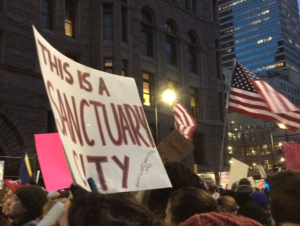News > Immigration In The United States
One more move against sanctuary cities – and cities resist
Posted on Apr 24 2017

[UPDATE: Judge rules in favor of sanctuary cities] On April 21, the Department of Justice made another move toward penalizing “sanctuary cities.” The DOJ sent letters to nine jurisdictions “having laws that potentially violate 8 U.S.C. §1373,” telling them to provide proof that they are in compliance by June 30.
A press release accompanying the letters charged that “many of these jurisdictions are also crumbling under the weight of illegal immigration and violent crime.” Specifically, the press release charged that, “New York City continues to see gang murder after gang murder, the predictable consequence of the city’s ‘soft on crime’ stance.” New York’s mayor and police chief responded with angry denials:
“[NYC Mayor Bill] De Blasio said such remarks were “absolutely outrageous”. James O’Neill, head of New York’s police department, similarly rejected the justice department’s claims, saying they showed “a willful disregard for the facts”.
“O’Neill noted that 2016 saw the fewest shootings in New York City history since it began keeping records, and that since 1993, “murder has decreased 82%, shootings have decreased 81%, and overall crime has decreased 76%. These are the facts.”
Apart from the “immigrants are criminals” rhetoric, the letters focus on defining sanctuary cities as in violation of U.S. law. Sessions chose to begin with these nine cities — Sacramento, Chicago, New Orleans, New York City, Philadelphia, Las Vegas, Miami, Milwaukee, New York, and Chicago —because each has a FY 2016 Byrne JAG grants from the Office of Justice Programs.
Hundreds of cities across the country have declared some kind of sanctuary. Since each city has its own ordinance, and its own federal grants, the attack has to proceed city by city.
Section 1373 says that local authorities may not order public officials to withhold information from immigration authorities about people’s immigration status. Separation ordinances, while varying from city to city, generally order local officials not to inquire about immigration status. If public officials never get the information, they cannot either supply or withhold it. (Most separation ordinances specify exceptions: officials may ask about immigration status if required by law (e.g. eligibility for food stamps) or if someone is convicted of a crime.)
Some cities are actively resisting Trump administration anti-sanctuary moves. San Francisco has sued the Trump administration, saying that Trump’s executive order is unconstitutional because it tries to make local officials enforce federal laws. In a court hearing, the attorney for the Trump administration argued that Trump’s order was more like speaking from a “bully pulpit” and wouldn’t actually force the cities to do anything. Seattle has also sued, saying that its sanctuary city policies make the city safer for all residents.
It’s not clear how much federal money could be at stake.
Both Minneapolis and St. Paul have sanctuary ordinances.
UPDATE: U.S. District Court in San Francisco issued a preliminary injunction in city’s lawsuit against Trump executive order, stopping enforcement against sanctuary cities.
For more information:
- U.S. Department of Justice threatens so-called sanctuary jurisdictions (Immigration Prof Blog, 4/22/17)
- Sanctuary Cities Face Aid Cuts as Justice Dept. Tightens Screws (New York Times, 4/22/17)
- Justice Department warns sanctuary cities in California, 8 other jurisdictions to cooperate with immigration enforcement, Los Angeles Times, 4/21/17)
- Department of Justice Sends Letter to Nine Jurisdictions Requiring Proof of Compliance with 8 U.S.C. 1373 (DOJ Press Release, 4/21/17)
- Text of DOJ letters to cities (4/21/17)
- Judge weighs arguments in SF, Santa Clara sanctuary cities case (San Francisco Chronicle, 4/14/17)
- Seattle sues Trump administration over sanctuary city orders (Curbed Seattle, 3/29/17)




